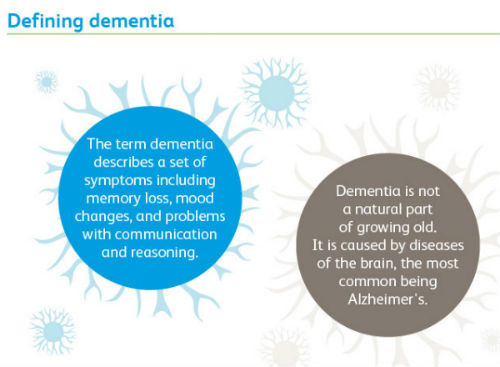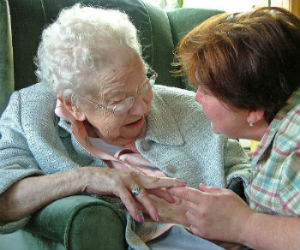As part of Dementia Awareness Week, supported by the Alzheimer's Society, we have compiled a variety of content including academic articles, interviews and guides on dementia to help raise awareness. Choose from the following sections below to get started:
 What is dementia?
What is dementia?
Dementia is an umbrella term used to describe a number of different disorders that affect the brain, particularly memory, behaviour, thinking and emotion.
Alzheimer's disease is the most common form of dementia. Other causes include vascular disease, dementia with Lewy bodies and fronto-temporal dementia.
Dementia symptoms include difficulty recalling recent events, concentrating and following conversation.
Dementia is incurable but research into a cure is ongoing.
Mixed dementia is possible, for example some people have Alzheimer's disease as well as Vascular disease.
Who is affected?
Dementia can affect anyone, anywhere - regardless of race or socio-economic background.
One in three people over the age of 65 will develop dementia but people as young as 40 have been diagnosed.
Two-thirds of dementia victims are women, this could be due to the lack of oestrogen after the menopause.
People in the developed world see more cases of dementia. However, this is because people live longer than those in poorer countries.
Family members and close friends are often affected by the progress of a loved one's dementia due to little help and lack of understanding.
Carers can be overworked and dementia sufferers distressed as there is an insufficiency of support and resources.
 What are the symptoms?
What are the symptoms?
Every person will experience dementia differently and some of the signs are not always obvious. Hence, there's usually a late diagnosis. Some of the most common symptoms include:
- Difficulty recalling recent events but remembering the past
- Unable to make decisions
- Problems with finding the right word
- Losing track of the day/date
- Confusion of their whereabouts
- Difficulties carrying out an everyday series of tasks such as cooking
- Inability to judge distances such as the stairs
- Trouble handling money, particularly in shops
- Changes in personality or mood
- Depression
Can I reduce the risk of getting dementia?
About a fifth of people think it's impossible to reduce their risk of dementia. However, there is a vast amount of evidence showing seven simple lifestyle choices that can help prevent the onset of dementia.
- Regular exercise - just 30 minutes of walking, swimming or everyday workouts such as housework are beneficial.
- Healthy diet - follow a mediterranean diet, avoid saturated fats and eat superfoods such as ginger and blueberries
- Mental stimulation - do some brain boosting activities; learn a new language, enjoy puzzles or read a good book.
- Avoid smoking - nicotine damages the blood vessels and reduces the amount of blood that reaches your brain.
- Manage existing illnesses - other health conditions such as type 2 diabetes can increase the risk of dementia.
- Reduce stress - don't forget to breathe when you feel stressed and take up a calming activity such as yoga or meditation.
- Be sociable - make a date with friends, volunteer or join a new activity club and keep in contact over social media.
Learn more about healthy diets
Can I take a dementia care course?
Here at OpenLearn we offer a fantastic range of free courses on health and social care. You may also want to take your interest in dementia and health care further by taking an Open University course.
Support and information
Call the Alzheimer's Society National Dementia Helpline on 0300 222 1122. Visit www.alzheimers.org.uk for more information, advice and support in your local area.
Discover more about care services ran by the NHS or social services on the NHS website or find your local authority to see what support they can offer.
Visit www.dementiacare.org.uk for training, care and advice. You can also find out more on day clubs for people with dementia and their carers.
Rate and Review
Rate this article
Review this article
Log into OpenLearn to leave reviews and join in the conversation.
Article reviews